

Amplification & the changing role of media. For the past few days, I have been thinking about the evolution of what media is and its expanded role in the information ecosystem.
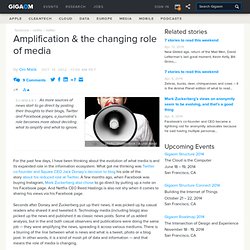
What got me thinking was Twitter co-founder and Square CEO Jack Dorsey’s decision to blog his side of the story about his reduced role at Twitter. A few months ago, when Facebook was buying Instagram, Mark Zuckerberg also chose to go direct by putting up a note on his Facebook page. And Netflix CEO Reed Hastings is also not shy when it comes to sharing his views via his Facebook page. Seconds after Dorsey and Zuckerberg put up their news, it was picked up by casual readers who shared it and tweeted it. Map of Life aims to digitally catalog and pinpoint the Earth's species. A team of researchers has embarked on a potentially groundbreaking project known as the Map of Life — an online database designed to catalog and locate every known plant and animal species on Earth.
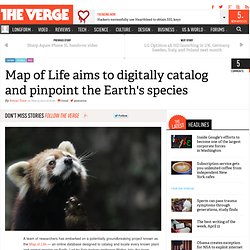
Led by Yale biology professor Walter Jetz, the team recently released a beta version of the tool, which already features location data on more than 25,000 species. With the browser-based app, users can search for a plant or animal by name, or right-click any region of the map to bring up a list of species within a given radius. The concept behind the project is rather straightforward, but its effects could be profound. Scientists are currently aware of about two million plant and animal species on Earth, though estimates suggest that the total number may be far greater. Mapping out this biodiversity is even more difficult, due to inconsistent reporting and infrequently updated datasets.
AP turns to citizen reporters for live video news — Online Video News. Twitcident: Fighting Fire with Information from Social Web Streams. Twitcident crowdsources tweets to help out in crises. Researchers from the Delft University of Technology in the Netherlands have created Twitcident, a framework for filtering and analyzing tweets to crowdsource information about crises.
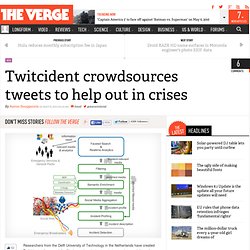
For the past ten months the system has been in testing as a support program for the Dutch police and fire department. The team began by connecting Twitcident to the Dutch emergency broadcast system in order to ascertain when an emergency had taken place. Once an emergency had been flagged, the system began to search Twitter for related tweets. An algorithm then filtered tweets to extract the relevant data, presenting valuable information to emergency services in realtime. What happens when journalism is everywhere? When the Arab Spring demonstrations were under way in Egypt’s Tahrir Square and reports were streaming out through Twitter and Facebook and text messages and cellphone videos, it was easy to feel superior to the Egyptian government. How could they not realize that information can no longer be contained by blockades or even internet blackouts when everyone has the power to publish?
Now the authorities in New York City and elsewhere have been getting a dose of that medicine, with the “Occupy Wall Street” protests being tweeted and live-streamed in real time. As the Associated Press learned this week to its chagrin, we all have newswires at our disposal now. Curate, create and conquer: Journalism 2.0 startups to watch. The race to uncover the next big thing in journalism is firmly underway.
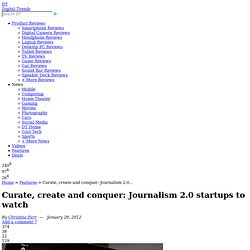
While media giants like AOL and Yahoo experiment with content betas, a small army of startups continue to jostle for position with new staffers, new technology, and new ideas. And they’re doing it almost exclusively online. Putting down roots In many ways, the Internet has leveled the playing field in the digital media space. Where a few prominent outlets like the New York Times and Wall Street Journal once towered over all else, a complex ecosystem of online news sites, blogs and other upstarts now challenges their superiority. This year’s most promising new venture may be PandoDaily, a blog launched amid much fanfare this month. PandoDaily’s success can be partially attributed to the high-profile status of its founder, but the money trail has some important clues too. Shafqat Islam, a digital media entrepreneur, said recent structural change in the industry had opened up large opportunities for innovation.
Personal Journalist Accounts Preferred on Twitter. The International Journal of Communication has released a report, looking back on how Twitter was used this year to disseminate information during the uprisings in Egypt and Tunisia.
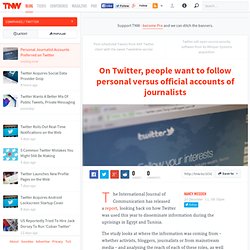
The study looks at where the information was coming from – whether activists, bloggers, journalists or from mainstream media – and analysing the reach of each of these roles, as well as how ”Twitter plays a “key role in amplifying and spreading timely information across the globe.” Analysing over 150,000 tweets posted from January 12 to 19, 2011 using the hashtags #sidibouzid’ or ‘tunisia’ and over 200,00 tweets posted from January 24 to 29, 2011, containing the hashtags ‘#egypt’ or ‘#jan25,′ a huge wealth of information on how content on Twitter is being received, depending on who’s doing the tweeting. This sheds an interesting light on how Twitter is being used in journalism . The extent of interaction can be seen in the average number of responses a tweet gets, depending on their particular role. If we are all journalists, should we all be protected?